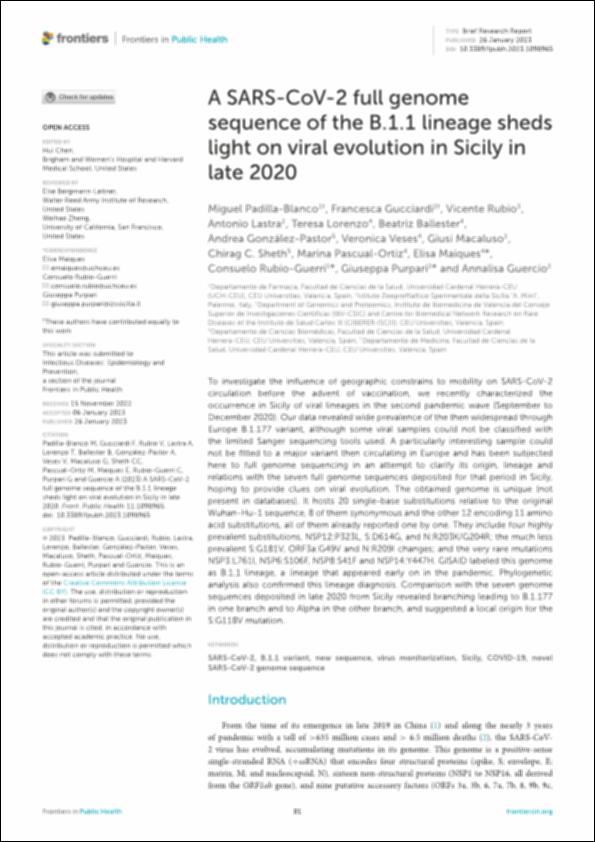Por favor, use este identificador para citar o enlazar este ítem:
http://hdl.handle.net/10637/15087A SARS-CoV-2 full genome sequence of the B.1.1 lineage sheds light on viral evolution in Sicily in late 2020
| Título : | A SARS-CoV-2 full genome sequence of the B.1.1 lineage sheds light on viral evolution in Sicily in late 2020 |
| Autor : | Padilla Blanco, Miguel Gucciardi, Francesca Rubio, Vicente Lastra, Antonio Lorenzo Bermejo, Teresa Ballester Llobell, Beatriz González Pastor, Andrea Veses Jiménez, Verónica. Macaluso, Giusi Sheth Shah, Chirag Chandrakant Pascual Ortiz, Marina Maiques Fernández, Elisa Rubio Guerri, Consuelo Purpari, Giuseppa Guercio, Annalisa |
| Materias: | Virus; Viruses; Genoma; Genome; SARS-CoV-2 (Virus); Italia; Italy |
| Editorial : | Frontiers Media |
| Citación : | Padilla-Blanco, M., Gucciardi, F., Rubio, V., Lastra, A., Lorenzo, T., Ballester, B., González-Pastor, A., Veses, V., Macaluso, G., Sheth, C.C., Pascual-Ortiz, M., Maiques, E., Rubio-Guerri, C., Purpari, G. & Guercio, A. (2023). A SARS-CoV-2 full genome sequence of the B.1.1 lineage sheds light on viral evolution in Sicily in late 2020. Frontiers in Public Health, vol. 11, art. 1098965 (26 jan.). DOI: https://doi.org/10.3389/fpubh.2023.1098965 |
| Resumen : | To investigate the influence of geographic constrains to mobility on SARS-CoV-2 circulation before the advent of vaccination, we recently characterized the occurrence in Sicily of viral lineages in the second pandemic wave (September to December 2020). Our data revealed wide prevalence of the then widespread through Europe B.1.177 variant, although some viral samples could not be classified with the limited Sanger sequencing tools used. A particularly interesting sample could not be fitted to a major variant then circulating in Europe and has been subjected here to full genome sequencing in an attempt to clarify its origin, lineage and relations with the seven full genome sequences deposited for that period in Sicily, hoping to provide clues on viral evolution. The obtained genome is unique (not present in databases). It hosts 20 single-base substitutions relative to the original Wuhan-Hu-1 sequence, 8 of them synonymous and the other 12 encoding 11 amino acid substitutions, all of them already reported one by one. They include four highly prevalent substitutions, NSP12:P323L, S:D614G, and N:R203K/G204R; the much less prevalent S:G181V, ORF3a:G49V and N:R209I changes; and the very rare mutations NSP3:L761I, NSP6:S106F, NSP8:S41F and NSP14:Y447H. GISAID labeled this genome as B.1.1 lineage, a lineage that appeared early on in the pandemic. Phylogenetic analysis also confirmed this lineage diagnosis. Comparison with the seven genome sequences deposited in late 2020 from Sicily revealed branching leading to B.1.177 in one branch and to Alpha in the other branch, and suggested a local origin for the S:G118V mutation. |
| URI : | http://hdl.handle.net/10637/15087 |
| Derechos: | https://creativecommons.org/licenses/by/4.0/deed.es Open Access |
| ISSN : | 2296-2565 (Electrónico) |
| Fecha de publicación : | 26-ene-2023 |
| Centro : | Universidad Cardenal Herrera-CEU |
| Aparece en las colecciones: | Dpto. Ciencias Biomédicas |
Los ítems de DSpace están protegidos por copyright, con todos los derechos reservados, a menos que se indique lo contrario.


